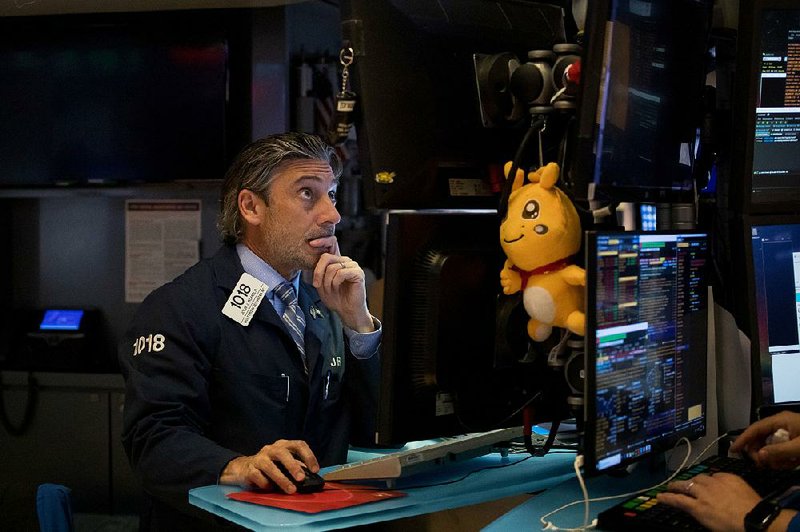The Dow Jones industrial average plunged more than 600 points Monday as investors sought shelter from an escalating trade war between the U.S. and China.
The selling was widespread and heavy, handing the benchmark S&P 500 index its biggest loss since January. The sell-off extended the market's slide into a second week. The losses so far in May have erased the market's gains from April.
The Dow dove 617.38 points, or 2.4%, to 25,324.99. Earlier, it was down 719 points. Apple and Boeing were the Dow's biggest decliners. Both companies get a significant amount of revenue from China and stand to lose heavily if the trade war drags on. Boeing slid 4.9%.
The broader S&P 500 index fell 69.53 points, or 2.4%, to 2,811.87. The index is coming off its worst week since January, though it's still up sharply for the year. The Nasdaq, which is heavily weighted with technology stocks, slid 269.92 points, or 3.4%, to 7,647.02, its worst drop of the year.
The Russell 2000 index of small-company stocks lost 49.99 points, or 3.2%, to 1,523.
Technology companies, which do a lot of business with China, led the way lower. Chipmakers were among the biggest decliners. Apple also took heavy losses, tumbling 5.8%. Farming-equipment-maker Deere drove losses in the industrial sector, reflecting worries about the impact of tariffs on U.S. farmers.
The world's two largest economies had seemed to be on track to resolve the ongoing trade dispute that has raised prices for consumers and pinched corporate profit margins. Investor confidence that the two sides were close to a resolution had helped push the market to its best yearly start in decades.
Those hopes are now replaced by concerns that the trade war could crimp what is otherwise a mostly healthy economy. Analysts have warned that failed trade talks and the deterioration in relations will put a dent in the U.S. and China's economic prospects.
"The larger issue with the tariffs isn't the specific amounts of tariffs at any given time, but the uncertainty that's surrounding these tariffs and the 'what's-next?' of an escalating trade war," said Willie Delwiche, investment strategist at Baird. "That weighs on the global economy and could then weigh on the U.S. economy."
Trade talks between the U.S. and China concluded Friday with no agreement and with the U.S. increasing import tariffs on $200 billion of Chinese goods to 25% from 10%. Officials also were preparing to expand tariffs to cover another $300 billion of goods.
China on Monday announced tariff increases on $60 billion of U.S. imports, particularly farm products like soybeans.
Analysts have said investors should prepare for a more volatile stock market while the trade dispute deepens. Many are still confident that both sides will eventually reach a deal.
"Since we see a trade accord being reached in the not-too-distant future, we don't expect the market to endure more than a short-lived spate of indigestion," said Sam Stovall, chief investment strategist at CFRA.
Technology stocks took the heaviest losses Monday. Chipmakers and other technology companies have warned that uncertainty over the trade war's outcome is prompting a slowdown in orders. Microchip Technology dropped 6.3% and Advanced Micro Devices lost 6.2%.
Bank stocks also fell sharply. Bank of America dropped 4.5% and JPMorgan Chase fell 2.7%.
Safe-play holdings were the only winners as traders sought to reduce their exposure to risk. Utilities were the only sector to notch a gain. Prices for U.S. government bonds, which are considered ultra-safe investments, rose sharply, sending yields lower. The yield on the 10-year Treasury fell to 2.40% from 2.45% late Friday.
Overseas markets also fell. European indexes mostly finished more than 1% lower. In Asia, the Shanghai Composite index fell 1.2%. Japan's Nikkei 225 index gave up 0.7% and South Korea's Kospi fell 1.4%.
In another sign of how nervous investors were feeling, an index known as Wall Street's "fear gauge," which measures how much volatility the market expects in the future, spiked 28.1%. The VIX, however, is still far below the elevated levels it reached at the end of last year when the S&P 500 came extremely close to entering a bear market, meaning a decline of 20% or more from a recent peak.
The deteriorating trade negotiations follow what has been a mostly calm period of trading where solid economic data and corporate earnings helped push the market steadily higher. The S&P 500 is still up 12.2% for the year with technology stocks still blowing away rest of the market with an 18% gain.
Investors have so far made it through the bulk of first-quarter corporate earnings reports in decent shape. Earlier in the year, they had expected earnings to severely contract. The results so far show less than a 1% drop in profit.
The escalating trade war threatens to spoil an expected earnings recovery in the second half, however.
"Investors are increasingly worried an anticipated second-half profit rebound may now evaporate as President [Donald] Trump's threat to tariff the remaining $325 billion in Chinese imports would disproportionately target consumer products like iPhones, thereby posing a greater threat to the consumption-driven U.S. economy," said Alec Young, managing director of global markets research at FTSE Russell.
Wholesale gasoline slid 1.3% to $1.96 per gallon. Heating oil lost 0.6% to $2.04 per gallon. Natural gas inched 0.1% higher to $2.62 per 1,000 cubic feet.
The dollar fell to 109.34 Japanese yen from 109.90 yen on Friday. The euro held steady at $1.1231.
Business on 05/14/2019
